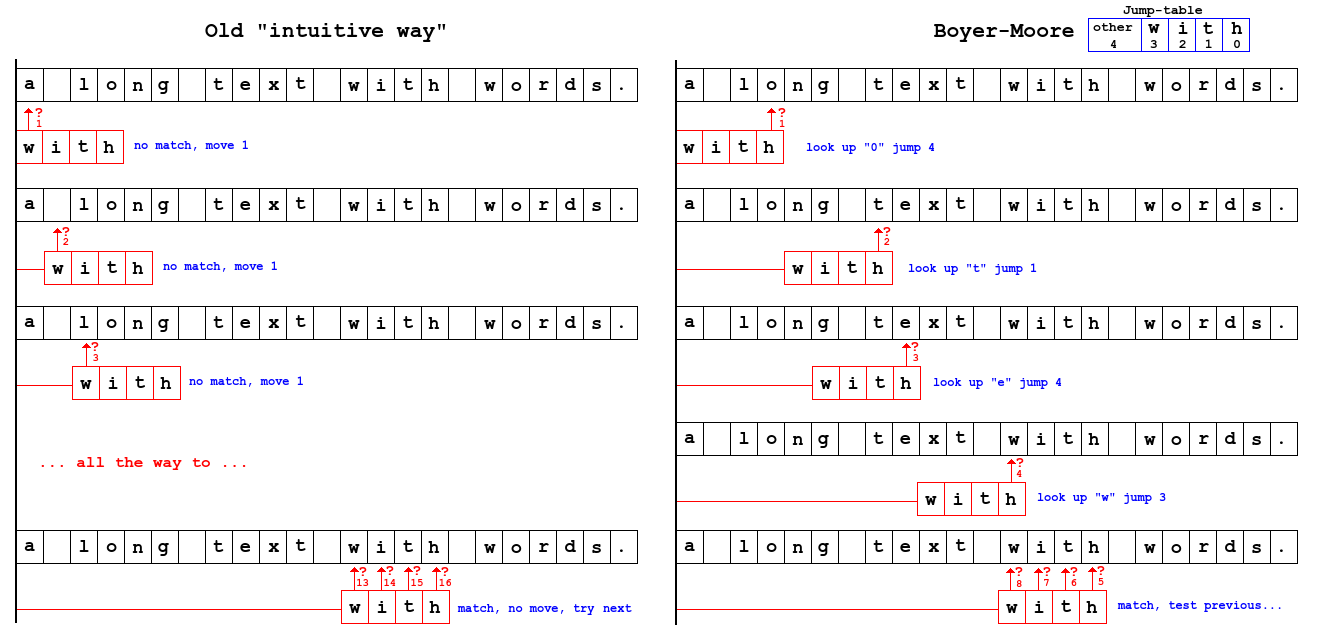Boyer–Moore string search
27 jan. 2013Tags: Python
In Digital Forensics 2 - 1st lecture one of the topics was how to search for similar words, words that are close to what we want. I remembered episode 203 of Security Now dedicated to a particular algorithm for improving the speed of search for exact strings.
The idea was instead of starting comparing a string character by character from the beginning of the search term, one should start at the end. If the last character does not match, a jump can be performed depending on a look up table that is very easy to generate. In this illustration, the old way uses 16 comparisons to find the match, while Boyer-Moore uses 8.

I decided to implement it in python. It's not very succinct, nor do I think it's particularly fast, but it's a good way to understand how the method works. Download:
# -*- coding: utf-8 -*-"""
Usage: "python search.py"
Give it a file
Search for terms, quit with "!q"
"""
import sysdef generate_lookup_table(length_pattern):
# How far we can jump if compared character in haystack matches any of the chars in the pattern
lookup_table = {}
a = length_pattern - 2
i = 1
while a >= 0:
char = pattern[a]
if not char in lookup_table:
lookup_table[char] = i
a -= 1
i += 1return lookup_table
def search(haystack, length_haystack, pattern, length_pattern, offset=0):
# length_haystack and length_pattern are input parameters to avoid unnecessary function calls
# offset is to continue from where the last hit was found
match = 0if ((length_pattern < 1) or (length_haystack < 1)):
return 0pos_pattern = length_pattern - 1
if offset:
pos_haystack = offset + length_pattern
else:
pos_haystack = pos_patterndef verify_match(pos_pattern, pos_haystack):
# compare backwards until a match was found or a mismatch happens
while(pos_pattern >= 0):
#print("pos_haystack: %s (%s), pos_pattern: %s (%s)") % (pos_haystack, haystack[pos_haystack], pos_pattern, pattern[pos_pattern])
if(pattern[pos_pattern] != haystack[pos_haystack]):
return 0pos_pattern -= 1
pos_haystack -= 1# If no return yet, a match was found
return pos_haystack + 1def optimal_jump(pos_haystack):
key = haystack[pos_haystack]
if key in lookup_table:
pos_haystack += lookup_table[key]
else:
pos_haystack += length_patternreturn pos_haystack
while(pos_haystack < length_haystack):
# Loop through the haystack, comparing the last char of the pattern...
#print("pos_haystack: %s (%s)") % (pos_haystack, haystack[pos_haystack])
if(pattern[pos_pattern] == haystack[pos_haystack]):
ret = verify_match(pos_pattern - 1, pos_haystack - 1)
if not ret:
pos_haystack = optimal_jump(pos_haystack)
else:
return ret
else:
pos_haystack = optimal_jump(pos_haystack)return match
print('What file do you want to search in?:')
filename = raw_input()
try:
with open(filename, mode='rb') as content:
haystack_orig = content.read()
except IOError, e:
print e
sys.exit()preview = 30 # how much before and after the hit is reported
program_loop = 1
while(program_loop):
print('\n\n\n\What you want to find: ("!q" to quit)')
pattern = raw_input()
if pattern != "!q":result = []
cont = 1
offset = 0
haystack = haystack_orig.lower()
pattern = pattern.lower()
length_pattern = len(pattern)
length_haystack = len(haystack)
lookup_table = generate_lookup_table(length_pattern)print("Searching for \"%s\" \nUsing lookup table%s") % (pattern, lookup_table)
while cont:
ret = search(haystack, length_haystack, pattern, length_pattern, offset)
if ret:
result.append(ret)
offset = ret
else:
cont = 0if(result):
print "Match(es) found at position(s) %s" % result
for i in result:
low = i - preview
if low < 0:
low = 0
high = i + length_pattern + preview
if high > length_haystack:
high = length_haystack
print "\"%s\"" % haystack_orig[low:high]
else:
print "No match found!"else:
program_loop = 0
 search
search